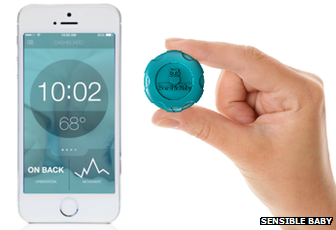Google unveils 'smart contact lens' to measure glucose levels
- Published
Smart contact lens could help millions of people with diabetes
Google has said it is testing a "smart contact lens" that can help measure glucose levels in tears.
It uses a "tiny" wireless chip and a "miniaturised" glucose sensor embedded between two layers of lens material.
The firm said it is also working on integrating tiny LED lights that could light up to indicate that glucose levels have crossed certain thresholds.
But it added that "a lot more work" needed to be done to get the technology ready for everyday use.
"It's still early days for this technology, but we've completed multiple clinical research studies which are helping to refine our prototype," the firm said in a blogpost, external.
"We hope this could someday lead to a new way for people with diabetes to manage their disease."
'Exciting development'
Many global firms have been looking to expand in the wearable technology sector - seen by many as a key growth area in the coming years.
Various estimates have said the sector is expected to grow by between $10bn and $50bn (£6bn and £31bn) in the next five years.
Within the sector, many firms have been looking specifically at technology targeted at healthcare.
Google's latest foray with the smart contact lens is aimed at a sector where consumer demand for such devices is expected to grow.
According to the International Diabetes Federation, external, one in ten people across the world's population are forecast to have diabetes by 2035.
People suffering from the condition need to monitor their glucose levels regularly as sudden spikes or drops are dangerous. At present, the majority of them do so by testing drops of blood.
Google said it was testing a prototype of the lens that could "generate a reading once per second".
"This is an exciting development for preventive healthcare industry," Manoj Menon, managing director of consulting firm Frost & Sullivan told the BBC.
"It is likely to spur a range of other innovations towards miniaturizing technology and using it in wearable devices to help people monitor their bodies better."
Open innovation?
Google said it was working with the US Food and Drug Administration (FDA) to bring the product to mainstream use.
It added that it would look for partners "who are experts in bringing products like this to market".
Google said it would work with these partners to develops apps aimed at making the measurements taken by the lens available to the wearer and their doctor.
Mr Menon said it was "commendable" that Google was willing to work with other partners even before the product was commercially ready.

Sensible Baby showcased a prototype baby sleep monitoring system at this year's CES
"Their open innovation approach is going to help accelerate the development of this product and get it out to the market much faster," he said.
Other firms have also been looking towards wearable products that help monitor the health of the wearer.
Earlier this month, a gadget called Sensible Baby was unveiled at the Consumer Electronics Show (CES) in Las Vegas. It is a sensor put in an infant's night clothes that tracks their temperature, orientation and movement.
It sounds a smartphone app alarm if it detects a problem.
Several smartwatches that can monitor data by studying key indicators such as the the wearer's heart rate and temperature have also been launched.
Last year, Japanese firm Sony filed a patent for a 'SmartWig', with healthcare cited as one of its potential uses.
It said the wig could use a combination of sensors to help collect information such as temperature, pulse and blood pressure of the wearer.
- Published7 January 2014
- Published8 January 2014
- Published15 January 2014